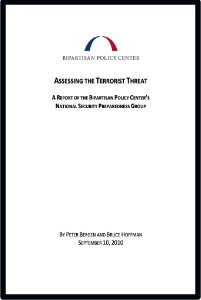By Peter Bergen and Bruce Hoffman
Al-Qaeda and allied groups continue to pose a threat to the United States. Although it is less severe than the catastrophic proportions of a 9/11-like attack, the threat today is more complex and more diverse than at any time over the past nine years. Al-Qaeda or its allies continue to have the capacity to kill dozens, or even hundreds, of Americans in a single attack. A key shift in the past couple of years is the increasingly prominent role in planning and operations that U.S. citizens and residents have played in the leadership of al-Qaeda and aligned groups, and the higher numbers of Americans attaching themselves to these groups. Another development is the increasing diversification of the types of U.S.-based jihadist militants, and the groups with which those militants have affiliated. Indeed, these jihadists do not fit any particular ethnic, economic, educational, or social profile. Al-Qaeda’s ideological influence on other jihadist groups is on the rise in South Asia and has continued to extend into countries like Yemen and Somalia; al-Qaeda’s top leaders are still at large, and American overreactions to even unsuccessful terrorist attacks arguably have played, however inadvertently, into the hands of the jihadists. Working against al-Qaeda and allied groups are the ramped-up campaign of drone attacks in Pakistan, increasingly negative Pakistani attitudes and actions against the militants based on their territory, which are mirrored by increasingly hostile attitudes toward alQaeda and allied groups in the Muslim world in general, and the fact that erstwhile militant allies have now also turned against al-Qaeda. This report is based on interviews with a wide range of senior U.S. counterterrorism officials at both the federal and local levels, and embracing the policy, intelligence, and law enforcement communities, supplemented by the authors’ own research.
Washington, DC: Bipartisan Policy Center’s National Security Preparedness Group (NSPG), 2010. 44p.


